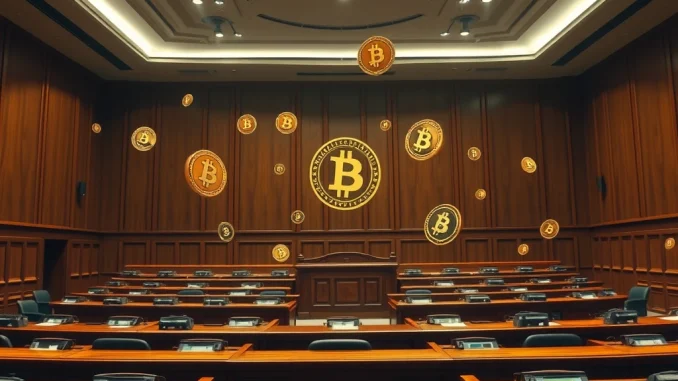
In a stunning turn of events that has sent ripples through the South Korean crypto landscape, a court has intervened to temporarily block sanctions imposed by financial regulators on Dunamu, the operator of the popular cryptocurrency exchange Upbit. For crypto enthusiasts and industry players alike, this news brings a moment of relief amidst ongoing regulatory pressures. Let’s dive into the details of this crucial development and understand what it means for Upbit and the broader crypto market in South Korea.
What’s the Latest on Upbit and South Korean Crypto Regulation?
According to Yonhap News Agency, the Seoul Administrative Court made a significant decision on March 27th. It granted a temporary stay of enforcement against the partial business suspension that the Financial Intelligence Unit (FIU) had issued to Dunamu. The FIU, operating under the Financial Services Commission (FSC), is the primary body overseeing financial regulations, including those related to the burgeoning crypto industry in South Korea. This court decision is a crucial development in the ongoing saga of crypto regulation within the nation.
Why Were FIU Sanctions Imposed on Dunamu?
The FIU’s move to impose sanctions stemmed from alleged violations of the Act on Reporting and Use of Specified Financial Transaction Information. This act is central to crypto regulation in South Korea, aiming to bring virtual assets under established financial compliance frameworks. The FIU identified supposed breaches by Dunamu and its employees, leading to the initial notice of partial business suspension.
The specifics of these alleged violations haven’t been fully disclosed publicly, but it’s understood they relate to compliance with the aforementioned Act. This situation highlights the complexities and evolving nature of regulatory adherence for cryptocurrency exchanges operating in jurisdictions like South Korea, which are known for their proactive stance on digital asset oversight.
Decoding the FIU Sanctions: What Did They Entail?
The FIU sanctions, which were initially slated to be in effect from March 7th to June 6th, were designed to be a partial business suspension. The key restriction was on newly registered users of Upbit. Specifically, these new users would have been prohibited from transferring crypto assets during the sanction period. Let’s break down the key implications of these measures:
- Targeted at New Users: The sanctions were specifically aimed at restricting activities of new users, suggesting a focus on onboarding processes and initial compliance checks.
- Crypto Asset Transfer Restriction: The core of the sanction was to prevent new users from transferring crypto assets, which could impact deposit and withdrawal functionalities for this user segment.
- Partial Business Suspension: It’s crucial to note that this was a partial suspension. Existing users and other aspects of Upbit’s operations were not directly targeted by these specific sanctions.
- Limited Duration: The planned duration was for three months, indicating a temporary measure intended to prompt corrective actions rather than a permanent shutdown.
The Court’s Intervention: A Temporary Halt – But What’s Next for Upbit?
The Seoul Administrative Court’s decision to grant a temporary stay is a significant win for Dunamu and Upbit, at least in the short term. It effectively puts the FIU sanctions on hold, preventing their immediate enforcement. However, it’s essential to understand that this is a temporary measure.
Here’s what we know and what we can infer:
- Temporary Stay: The court has only granted a temporary stay of enforcement. This means the legal proceedings are ongoing, and the court will further review the case.
- Not a Final Ruling: This is not a final verdict on the legality or appropriateness of the FIU sanctions. The court is essentially pausing the sanctions while it examines the matter more closely.
- Dunamu’s Legal Challenge: Dunamu likely challenged the FIU’s decision, arguing against the sanctions and seeking this temporary stay to prevent immediate business disruption.
- Future Court Proceedings: Expect further hearings and legal arguments as the court delves deeper into the case. The ultimate outcome could range from the court upholding the FIU sanctions to overturning them completely.
Impact on Upbit and the South Korean Crypto Market
The immediate impact of the court’s decision is undoubtedly positive for Upbit. The exchange can continue its operations without the immediate restrictions on new users. This is particularly important in the competitive South Korean crypto exchange market, where user acquisition and platform growth are key metrics. The halting of FIU sanctions provides a breathing space for Dunamu and Upbit.
Beyond Upbit, this development has broader implications for the South Korean crypto market:
- Precedent Setting: The court’s decision could set a precedent for how regulatory sanctions against crypto exchanges are challenged and reviewed in South Korea.
- Regulatory Scrutiny Continues: Despite this temporary reprieve, it’s clear that regulatory scrutiny of crypto exchanges in South Korea remains intense. Exchanges must prioritize compliance and be prepared for ongoing oversight.
- Market Confidence: The news could bolster market confidence in Upbit and potentially the broader South Korean crypto market, signaling that there are checks and balances in the regulatory process.
Looking Ahead: What Does This Mean for Crypto Regulation in South Korea?
This court decision underscores the complex interplay between regulators, crypto exchanges, and the legal system in South Korea. While it offers temporary relief to Upbit, it also highlights the ongoing tensions and negotiations shaping the future of crypto regulation in the country.
Key takeaways for the future:
- Importance of Legal Recourse: Crypto businesses have avenues to challenge regulatory actions through the legal system, and this case demonstrates the potential effectiveness of such challenges.
- Evolving Regulatory Landscape: The South Korean crypto regulatory landscape is still evolving. Expect continued adjustments, clarifications, and potentially stricter enforcement measures in the future.
- Compliance is Paramount: For crypto exchanges operating in South Korea, robust compliance frameworks and proactive engagement with regulators are more crucial than ever.
Conclusion: A Temporary Victory, But the Regulatory Journey Continues
The South Korean court’s decision to halt the FIU sanctions against Upbit operator Dunamu is a significant development. It provides a temporary reprieve for one of the nation’s largest crypto exchanges and underscores the dynamic nature of crypto regulation. While this news offers a moment of relief and optimism, it’s crucial to recognize that the regulatory journey for crypto in South Korea is far from over. The legal proceedings will continue, and the broader environment of regulatory scrutiny remains firmly in place. For the crypto industry, the key takeaway is clear: navigating this evolving landscape requires vigilance, proactive compliance, and a deep understanding of the legal and regulatory frameworks at play.



